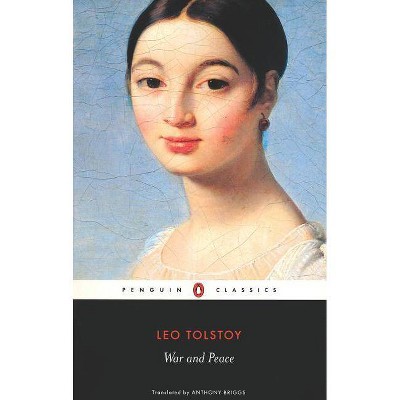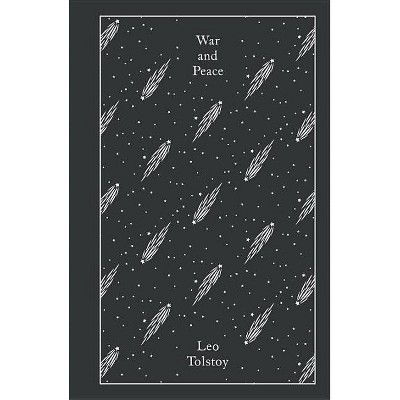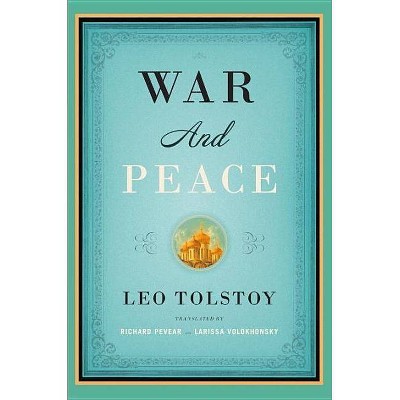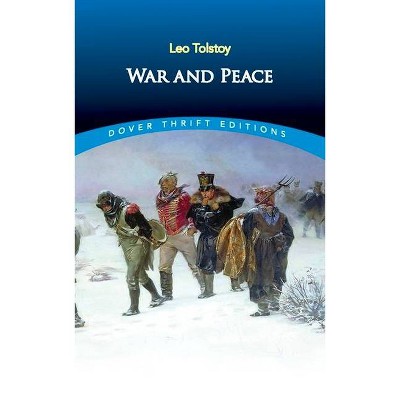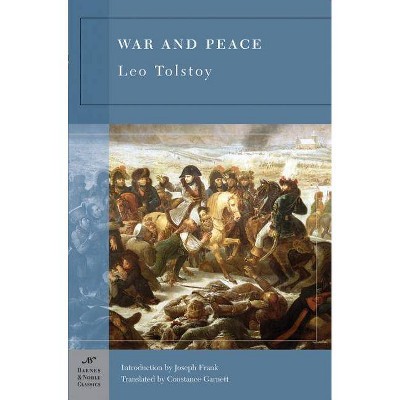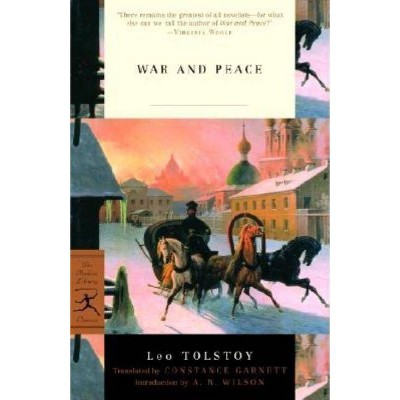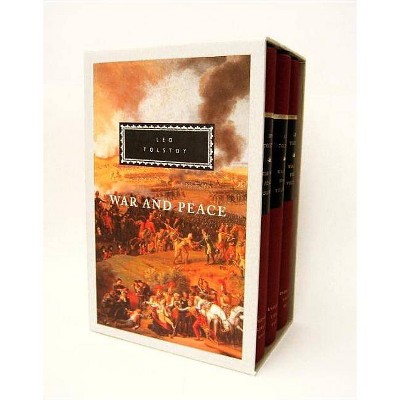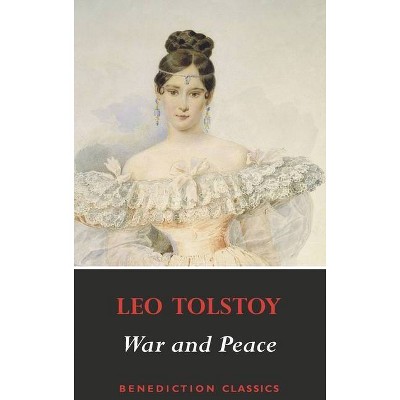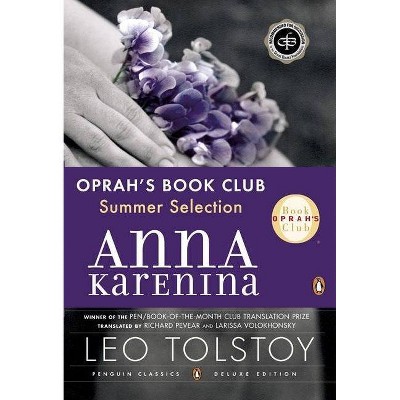War and Peace - (Penguin Classics Deluxe Editions) by Leo Tolstoy (Paperback)
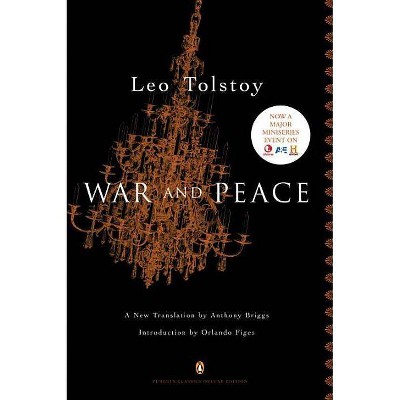
Similar Products
Products of same category from the store
AllProduct info
<p/><br></br><p><b> About the Book </b></p></br></br>The most famous--and perhaps greatest--novel of all time, Tolstoy's "War and Peace tells the story of five families struggling for survival during Napoleon's invasion of Russia.Among its many unforgettable characters is Prince Andrey Bolkonsky, a proud, dashing man who, despising the artifice of high society, joins the army to achieve glory. Badly wounded at Austerlitz, he begins to discover the emptiness of everything to which he has devoted himself. His death scene is considered one of the greatest passages in Russian literature.The novel's other hero, the bumbling Pierre Bezukhov, tries to find meaning in life through a series of philosophical systems that promise to resolve all questions. He at last discovers the Tolstoyan truth that wisdom is to be found not in systems but in the ordinary processes of daily life, especially in his marriage to the novel's most memorable heroine, Natasha. Both an intimate study of individual passions and an epic history of Russia and its people, "War and Peace is nothing more or less than a complete portrait of human existence. <BR><p/><br></br><p><b> Book Synopsis </b></p></br></br><b>A Penguin Classics Deluxe Edition of Tolstoy's great Russian epic. <b>Nominated as one of America's best-loved novels by PBS's <i>The Great American Read</i></b></b> <p/>Set against the sweeping panoply of Napoleon's invasion of Russia, <i>War and Peace</i>--presented here in the first new English translation in forty years--is often considered the greatest novel ever written. At its center are Pierre Bezukhov, searching for meaning in his life; cynical Prince Andrei, ennobled by wartime suffering; and Natasha Rostov, whose impulsiveness threatens to destroy her happiness. As Tolstoy follows the changing fortunes of his characters, he crafts a view of humanity that is both epic and intimate and that continues to define fiction at its most resplendent. <p/>This edition includes an introduction, note on the translation, cast of characters, maps, notes on the major battles depicted, and chapter summaries. <p/><b>Praise for Antony Brigg's translation of <i>War and Peace</i> <br></b><br> The best translation so far of Tolstoy's masterpiece into English.<br> -Robert A. Maguire, professor emeritus of Russian studies, Columbia University <p/> In Tolstoy's work part of the translator's difficulty lies in conveying not only the simplicity but the subtlety of the book's scale and effect. . . . Briggs has rendered both with a particular exactness and a vigorous precision not to be found, I think, in any previous translation.<br> -John Bayley, author of <i>Elegy for Iris</i> <p/>For more than seventy years, Penguin has been the leading publisher of classic literature in the English-speaking world. With more than 1,700 titles, Penguin Classics represents a global bookshelf of the best works throughout history and across genres and disciplines. Readers trust the series to provide authoritative texts enhanced by introductions and notes by distinguished scholars and contemporary authors, as well as up-to-date translations by award-winning translators.<p/><br></br><p><b> Review Quotes </b></p></br></br><br>"There remains the greatest of all novelists--for what else can we call the author of <i>War and Peace</i>?" --<b>Virginia Woolf</b><br><p/><br></br><p><b> About the Author </b></p></br></br><b>Count Leo Tolstoy</b> was born on September 9, 1828, in Yasnaya Polyana, Russia. Orphaned at nine, he was brought up by an elderly aunt and educated by French tutors until he matriculated at Kazan University in 1844. In 1847, he gave up his studies and, after several aimless years, volunteered for military duty in the army, serving as a junior officer in the Crimean War before retiring in 1857. In 1862, Tolstoy married Sophie Behrs, a marriage that was to become, for him, bitterly unhappy. His diary, started in 1847, was used for self-study and self-criticism; it served as the source from which he drew much of the material that appeared not only in his great novels <b>War and Peace</b> (1869) and <b>Anna Karenina</b> (1877), but also in his shorter works. Seeking religious justification for his life, Tolstoy evolved a new Christianity based upon his own interpretation of the Gospels. Yasnaya Polyana became a mecca for his many converts. At the age of eighty-two, while away from home, the writer suffered a break down in his health in Astapovo, Riazan, and he died there on November 20, 1910. <p/><b>Anthony Briggs</b> has written, translated, or edited twenty books in the fields of Russian and English literature. <p/><b>Orlando Figes </b>is the prizewinning author of <b>A People's Tragedy</b> and <b>Natasha's Dance</b>. He is a regular contributor to <b>The New York Times</b>, <b>The Washington Post</b>, and <b>The New York Review of Books</b>.
Price History
Price Archive shows prices from various stores, lets you see history and find the cheapest. There is no actual sale on the website. For all support, inquiry and suggestion messagescommunication@pricearchive.us
